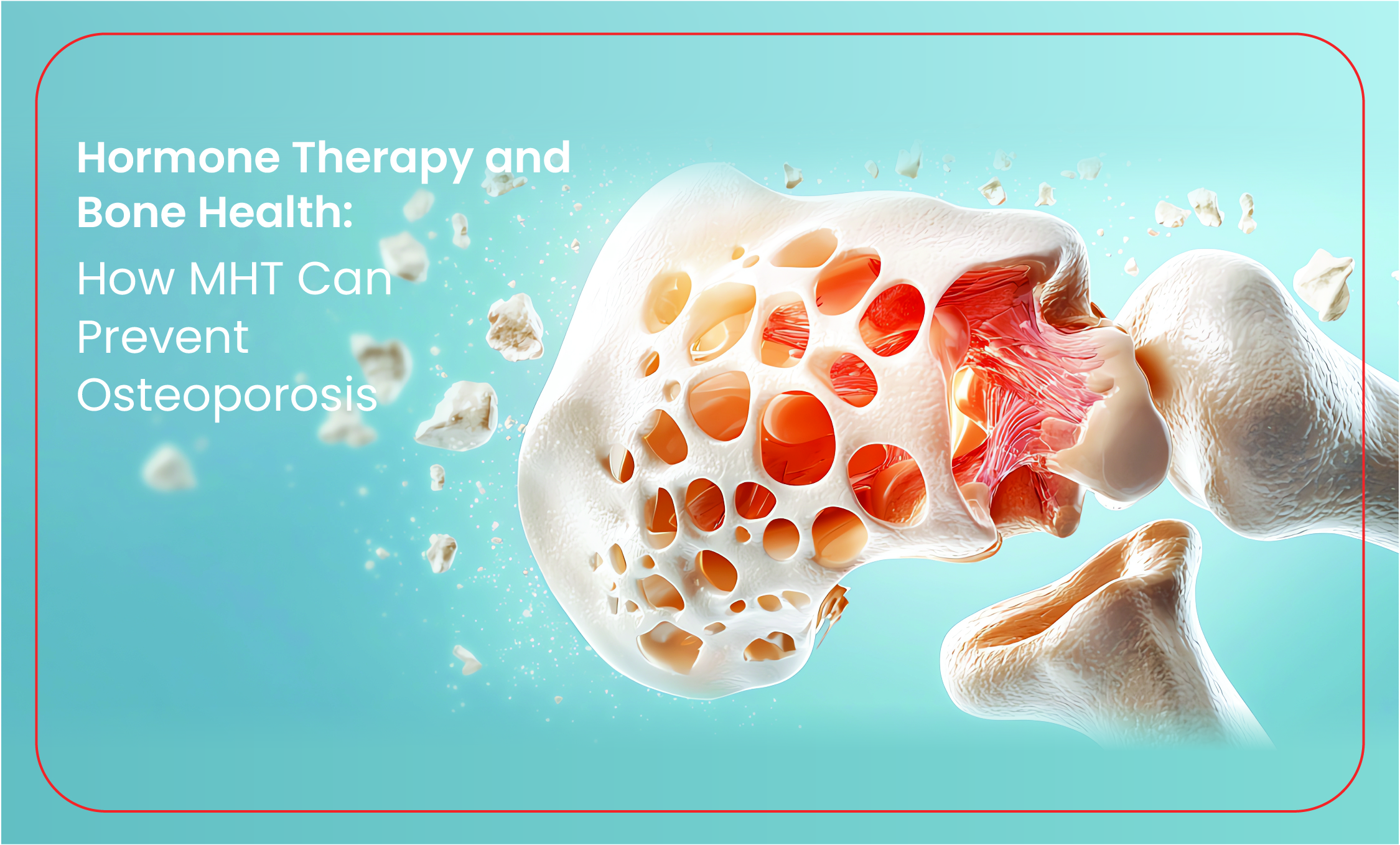
We often think of bones as strong and unchanging, but did you know they’re constantly being broken down and rebuilt throughout our lives? As we age—especially during and after menopause—this natural process can become unbalanced, leading to weakened bones and even osteoporosis. Fortunately, hormone therapy, particularly Menopausal Hormone Therapy (MHT), has been proven to play a powerful role in protecting bone health.
Osteoporosis is a condition where bones become fragile and more likely to break. The word literally means “porous bones.” Imagine the structure of a sponge—now imagine that inside your body. That’s what happens when you lose bone density. The bones weaken so much that even minor bumps or falls can cause fractures, especially in the spine, hips, or wrists.
The tricky part? Osteoporosis is often silent. You may not even know you have it until you break a bone. Some people notice they’re shrinking or developing a hunched posture—but by that point, the bone loss has already become serious.
One of the biggest factors affecting bone strength—especially in women—is estrogen. Estrogen doesn’t just help regulate menstrual cycles; it also helps maintain the strength and density of your bones. When estrogen levels drop after menopause, bones start to break down faster than they can rebuild.
This is why postmenopausal women are at a much higher risk for osteoporosis. The body’s natural defense system—estrogen—is no longer around to keep bones strong. That’s where MHT (Menopausal Hormone Therapy) steps in.
Menopausal Hormone Therapy is a medical treatment that replaces the estrogen (and sometimes progesterone) your body no longer produces after menopause. It’s not just for treating hot flashes or mood swings—MHT is also one of the most effective ways to protect bones and prevent osteoporosis.
There are two main types of MHT:
MHT can be taken in many forms—pills, skin patches, creams, gels, sprays, or vaginal rings. Your doctor will help you choose the right method based on your symptoms, lifestyle, and overall health.
When estrogen levels drop during menopause, bone loss speeds up. MHT helps by restoring estrogen levels, slowing bone breakdown, and helping the body maintain better bone density. It can also slightly increase bone mass, particularly in the spine and hips—two of the most common areas where osteoporosis-related fractures occur.
Here’s how MHT benefits your bones:
MHT isn’t suitable for everyone, but it can be incredibly helpful for the right candidates. You may benefit from MHT if:
If natural If you're unsure whether MHT is right for you, don’t rely on guesswork or online articles. Book a consultation with a hormone specialist. Dr Shreya Sharma, recognized as the best endocrinologist in Dehradun, can evaluate your hormone levels, family history, and bone health to recommend the safest, most effective treatment for you.
MHT vs Other Treatments for Osteoporosis:
Although there are many medications for treating osteoporosis—like bisphosphonates, SERMs, or injections—MHT offers unique advantages. While other drugs focus only on bone health, MHT not only protects bones but also improves sleep, reduces hot flashes, enhances mood, and improves skin and vaginal health.
This makes MHT a great choice for women who are in early menopause and want an all-in-one solution. That said, it’s important to discuss all available options with your doctor. The best hormone doctor won’t push one treatment over another but will help you weigh the benefits and risks of each.
Like any medical treatment, MHT comes with some risks. Some of the potential side effects include:
There are also more serious risks, such as an increased chance of:
However, it’s important to know that these risks vary from person to person. The latest research shows that short-term use of MHT started in early menopause (before age 60 or within 10 years of menopause) has far fewer risks and many benefits.
This is why professional guidance is crucial. When you consult someone like Dr Shreya Sharma, the best endocrinologist in Dehradun, you can trust that your treatment plan will be safe, science-backed, and personalized to your needs.
Whether you’re using hormone therapy or not, there are plenty of lifestyle choices that can help support strong bones and prevent osteoporosis:
Hormones are incredibly powerful and affect nearly every part of your body. That’s why it’s important to consult a specialist—someone who understands how hormone therapy works, how to monitor your response, and how to adjust your treatment over time.
Dr Shreya Sharma is known as the best endocrinologist in Dehradun because of her compassionate care, deep medical expertise, and ability to create customized treatment plans for each patient. Whether you're struggling with menopause symptoms or worried about osteoporosis, Dr Shreya Sharma, the best hormone doctor, can help you find a safe and effective path forward.
There’s a lot of misinformation out there about hormone therapy. Let’s clear up a few common myths:
If you’re entering menopause or are concerned about osteoporosis, Menopausal Hormone Therapy could be a game-changer. Not only can it help preserve your bone strength, but it can also improve your overall quality of life by managing other menopause symptoms.
However, the decision to start hormone therapy shouldn’t be made lightly. It needs to be based on a complete health evaluation, family history, and personal risk factors. That’s why consulting with a trusted expert like Dr Shreya Sharma, the best endocrinologist in Dehradun, is the smartest step you can take.
She’ll help you understand your options, guide you through the benefits and risks, and design a plan that supports both your bones and your body.
Don’t wait for a fracture to remind you how important your bones are. Whether you’re newly menopausal or have already begun to notice changes in your bone health, hormone therapy could offer real relief and protection. And with the expert guidance of Dr Shreya Sharma, the best hormone doctor, you’re in safe hands.
Make your health a priority. Schedule your appointment today with the best endocrinologist in Dehradun and take control of your bone health before osteoporosis takes control of you.